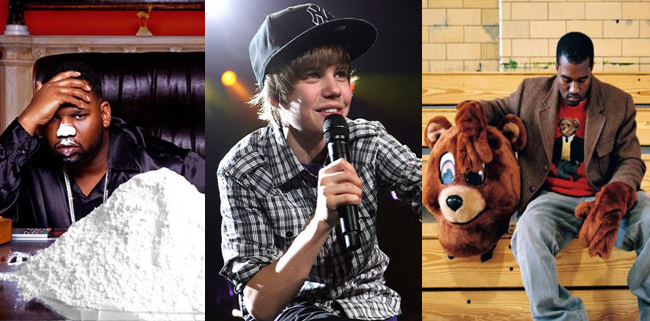
I have this argument with a very good friend of mine all time. If there’s a pop or R&B song we both like—like, for instance, “Buy U a Drank” by T-Pain—he will make it a point to say that he doesn’t consider it “good music,” but rather just likes it for, if you will, the lulz. What is and isn’t “real hip-hop” matters to him, and it matters a lot. The Roots accepting the Late Night With Jimmy Fallon gig was a traumatic day for him, and the two best Kanye West albums are, inarguably and definitively, College Dropout and Late Registration.
Naturally, he didn’t take well the news earlier this week that the rumored-on-Twitter collaboration between Raekwon, Kanye, and Justin Bieber was a reality. Correct me if I’m wrong, but it doesn’t get more real than Wu-Tang, right? Would most hardcore hip-hop heads not consider Enter the Wu Tang: 36 Chambers one of the five best rap albums of all time? And for that matter, isn’t Raekwon’s solo debut, 1995’s Only Built 4 Cuban Linx, pretty high up there in the “real hip-hop” pantheon? If Rae is collaborating with Justin freaking Bieber (or, more accurately, doing anything to acknowledge Bieber’s existence besides recording a diss track and/or hiring a hit man in the name of all that is sacred in rap), doesn’t that go against everything “real” hip-hop stands for? And if Raekwon has sold out, then what hope is there?
The answer is simple: “real” hip-hop does not exist and has never existed, at least not in the context that fans of Common and Talib Kweli view it in. The thinking goes that artists who rap about Really Important Social Issues are somehow more legit than rappers whose subject matter is more lighthearted. Whenever you hear somebody talk about “bringing back real hip-hop,” what they usually mean is that they aspire to sound like Public Enemy, Run-DMC, or A Tribe Called Quest. These (and a select few others) are the generally accepted reference points for what constitutes good “underground” hip-hop, and anything more commercial than that isn’t being true to the roots of the genre.
But here’s the thing: at the beginning of the hip-hop movement in the mid-‘70s, going back even before the first rap records were made, the point of the MC was to talk up the DJ and get people excited about his block parties. So wouldn’t Lil Jon, by definition, be more authentic than someone who’s consciously old-school, like a Brother Ali? Hip-hop was dance music in the beginning. It wasn’t until the 1980s, when it transformed into a primarily recorded genre, that the values people attach to it today started to fall into place, and since then, hip-hop purists have become more dogmatic and hard-line about what does and doesn’t “count” than fans of any genre outside of punk.
Hip-hop as we know it has only existed for three decades, and already anybody who doesn’t follow the blueprint laid out by these early innovators isn’t “real.” Imagine if the majority of rock fans had this mentality in 1980. What if an arbitrary list of three groups—for the sake of argument, let’s say the Stones, Hendrix, and Zeppelin—were chosen as the measuring stick for rock legitimacy, and anybody who didn’t write songs in that style, with similar lyrical content, wasn’t “real” rock. How ridiculous does that sound? Would Radiohead not qualify as a real rock band under these parameters? Would the Talking Heads be disregarded as not staying true to the roots of the genre? An art form can’t evolve if there’s a universal and unimpeachable grading rubric. To use a baseball analogy, Manny Ramirez is often criticized for not “respecting the game,” but remind me again how many World Series titles he led the Red Sox to?
To me, the idea that more serious-minded artists are more “legitimate” than pop artists is elitist and narrow-minded. I’m not saying everybody has to like everything on the radio, I’m just saying that if something commercial that doesn’t fit the accepted definition of “real” hip-hop is good, there’s no reason you shouldn’t just go with it. Sure, Drake sucks, but that has nothing to do with his not trying to sound like De La Soul—he sucks because his music is mostly hookless and lethargic and he whines too much about how miserable it is to be famous from riding the coattails of people much more talented than he is. But you know what? If Drake’s next album were good, I’d have no qualms about reversing my opinion of him. Ten years ago, did any of us think that Justin Timberlake would have any kind of serious artistic credibility once the N’ Sync craze died down? Why do there need to be this many goddamn rules?
So Raekwon and Kanye West are going to collaborate with Justin Bieber. That doesn’t prove that anybody sold out or that Wu-Tang must now be stricken from the “real hip-hop” canon, because I don’t get the impression that either of those two are the kind of artists who would do a song with someone like Bieber just to stay relevant. They must see something in him. And maybe they’re right, realness be damned.
